Nvidia Pushes Kepler for Cloud Gaming With GeForce Grid
Nvidia announced a new gaming-focused cloud implementation of its Kepler GPU technology.
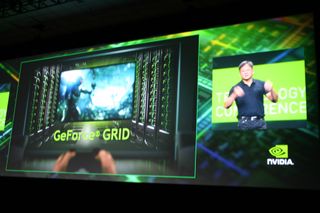
Although the majority of focus at Nvidia's GPU Technology Conference is on the enterprise, scientific and business uses for graphics processors, the company didn't forget that many people buy its products for gaming.
Today, Nvidia announced what it calls the GeForce Grid cloud gaming platform, which is all about streaming next-generation games to virtually any device, without the amount of lag that hampers current offerings.
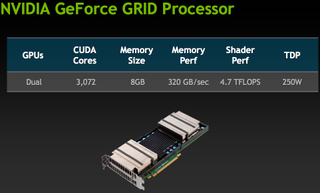
Using the Kepler architecture, GeForce Grid GPUs minimize power consumption by simultaneously encoding up to eight game streams. This allows providers to cost-effectively scale their service offerings to support millions of concurrent gamers.
Featuring two Kepler architecture-based GPUs, each with its own encoder, the processors have 3,072 CUDA technology cores and 4.7 teraflops of 3D shader performance. This enables providers to render highly complex games in the cloud and encode them on the GPU, rather than the CPU, allowing their servers to simultaneously run more game streams. Server power-consumption per game stream is reduced to about one-half that of previous implementations, an important metric for data centers.
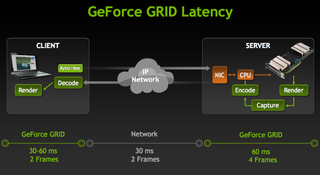
At GTC, Nvidia and Gaikai demonstrated a virtual game console, consisting of an LG Cinema 3D Smart TV running a Gaikai application connected to a GeForce Grid GPU in a server 10 miles away. What appeared was relatively lag-free play through just an Ethernet cable and wireless USB game pad connected to the TV.
Stay on the Cutting Edge
Join the experts who read Tom's Hardware for the inside track on enthusiast PC tech news — and have for over 25 years. We'll send breaking news and in-depth reviews of CPUs, GPUs, AI, maker hardware and more straight to your inbox.
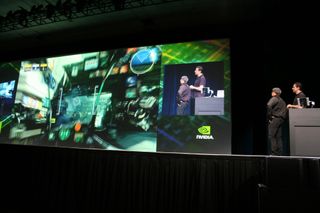
At the post-event keynote Q&A, Nvidia CEO Jen-Hsun Huang in response to a question clarified some of the latency claims. Nvidia's slide claims that it's able to drop more than 100ms from current cloud services and be even better than today's local consoles.
Digging a bit deeper into those numbers, Huang said that today's consoles are using technology that's 6-7 years old. With that hardware stretched to the very limit, machines are already straining to deliver the most latency-free play. In comparison, he says, Kepler can deliver 60 frames-per-second without breaking a sweat. Furthermore, images rendered by Kepler now skip the framebuffer, further cutting down time in the hardware.
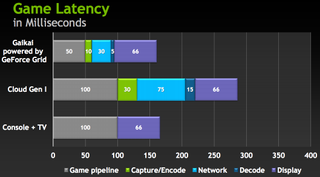
Much of the speed increase comes right from the faster hardware in Kepler, with the external factor of the display remaining static. There's no doubt in our minds that GeForce Grid – which is essentially a brand of Nvidia Kepler-powered cloud gaming hardware – is faster than what we had yesterday, but then again, what we will have tomorrow will always be faster than what we have today.
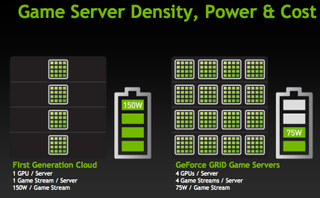
The real interesting possibility to come out of the savings afforded by more advanced hardware is what Nvidia hopes to become a Netflix-like economy of scale. Instead of devoting one GPU to one user, Kepler in servers can split the load to achieve bigger cost and power efficiencies. Nvidia envisions this to lead to a flat $10 monthly games subscription, and that's something everyone would want.
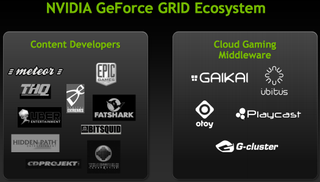
Read more about what Nvidia's CEO announced today at the keynote.
-
Youngmind Hopefully, this will help to drive videogame development and bring the focus back to the PC because it'll help to attract some of the mainstream gamers because of its cheapness. Then, because of that focus on the PC games and their graphics, should help to fuel video card innovation.Reply -
alxianthelast I think an important question is HOW this could impact actual nexgen console experiences, including MMOs, IF servers are supported by 3rd parties to begin with.Reply
An argument could be made for encouraging Microsoft to invest in a cloud gaming service for their next evolution of Xbox and Xbox Live. If it means justifying $15 a month or more for an Xbox Live subscription.. AND for developers that their games can't be pirated AND they can push updates whenever they wanted..
Asking if someone wants an overkill $1000 toaster to get that much more performance from a directx 9.0c game because Devs 'can't afford PC game development, and whatever more the computer will cost to run, versus Xbox 3, Xbox LIVE, and games powered by a cloud service.. the console seems much more appealing especially if you can pay to scale up your games performance.. or split it into even more processes running on each GPU when you're idling in a lobby or not doing anything not very intensive. -
cumi2k4 with the bandwidth throttling trend nowadays...not only you will not be able to browse comfortably, watch streaming movie, now you can't even play your game? great move to push people to go back reading books again.....Reply -
IndignantSkeptic I think I will get a cloud server supercomputer in my house to play games directly on. Sure all my bills would be huge but I'll be making a profit because when I'm not playing games on it then it can automatically rent itself out to other users over the internet to use for their computationally intensive work or whatever.Reply -
Plasmid crapfacednoobSo we are paying more for 100+ ping in just our local network.....Reply
I don't know how this will be a pleasant gaming experience with such ping. For me 150 ping is pretty mediocre despite their praise. -
atikkur this is not cool.. dont too much focus on this, you know everyone loves to see real hardware to play with.Reply -
amk-aka-Phantom Oh, here we go, I predicted this bullshit... nVidia and AMD aren't going anywhere, they'll just switch to providing cloud BS for us instead of proper gaming. That sucks.Reply
Most Popular



